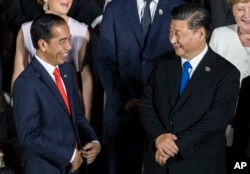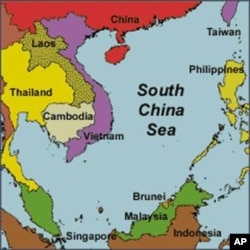
[ad_1]
Taipei, Taiwan – Defense Minister Prabowo Subianto, once a fierce critic of China, has emerged as the likely winner of Indonesia’s presidential election. His presumed victory, analysts say, is unlikely to lead to any major shifts in the Southeast Asian nation’s relations with Beijing.
However, concerns about work safety and environmental pollution linked to Chinese investments, as well as Beijing’s claims in the South China Sea, could test the stability of the relationship.
While President Joko Widodo was in office, China became Indonesia’s largest trading partner, tapping into its rich resources. Jokowi, as he is often called, has urged China to bring even more capital to Indonesia, which has become a key participant in its Belt and Road Initiative.
Beijing has invested billions supporting major infrastructure construction in Indonesia, including the Jakarta-Bandung High Speed Railway, which opened in October, and Cirata, Southeast Asia’s largest floating solar power project, which went completely online last year.
‘I don’t think there will be a dramatic change in relations with China,” Faisal Nurdin Idris, a lecturer at the department of international relations at UIN Jakarta, told VOA Mandarin Service. “Jokowi has built a strong relationship economically with China.”
 FILE – Indonesian President Joko Widodo, left, speaks to Chinese President Xi Jinping at the G-20 summit on June 28, 2019, in Osaka, Japan. During Widodo’s time as president, China became Indonesia’s largest trading partner.
FILE – Indonesian President Joko Widodo, left, speaks to Chinese President Xi Jinping at the G-20 summit on June 28, 2019, in Osaka, Japan. During Widodo’s time as president, China became Indonesia’s largest trading partner.
During his previous run for president in 2019, Prabowo tried to turn Jokowi’s warm relations with China against him, seizing on public anger against Beijing with suggestions that Chinese workers were stealing local jobs.
But in more recent speeches, Prabowo has expressed a desire to have good relations with the U.S. and China at the same time.
Speaking at a forum at the Center for Strategic and International Studies in Jakarta in November, he noted that Washington played a historic role in pressuring the Netherlands to recognize Indonesian sovereignty in the 1940s and praised China’s economic accomplishments.
Despite their benefits to development, China’s investments in Indonesia have also come with controversy.
Teuku Rezasyah, associate professor in international relations at Padjadjaran University, said Indonesia has previously reported several accidents at Chinese-owned factories and environmental pollution incidents that have raised dissatisfaction among locals.
He said this is a problem that Prabowo must carefully consider before taking office.
Otherwise, even if the government welcomes Chinese investment with open arms, it may cause local environmental and social problems, and improper handling could trigger anti-China sentiment.
‘Some Chinese investment came too quickly to Indonesia. Often, it was a political decision,” Teuku said. “Demonstrations came in Morowali because the people found that the investment would not benefit them.”
At the end of last year, an explosion occurred at one of the Chinese-financed nickel processing plants in Indonesia’s Morowali Industrial Park and killed 21 people. The incident became the third fatal event at a Chinese-owned nickel smelter in Central Sulawesi that year, and hundreds of Indonesian workers protested at the factory. Police this week named two Chinese citizens as suspects.
Prabowo is aware of the problems at some investment projects, and he has from now until he is sworn in in late October to come up with solutions, Teuku said.
 China’s claims to the South China Sea have strained its relations with its neighbors.
China’s claims to the South China Sea have strained its relations with its neighbors.
In addition to Chinese investment, how Prabowo will handle the sovereignty issues between Indonesia and China in the future will also be key to watch.
Like several of its Southeast Asian neighbors, Indonesia disputes China’s claim to most of the South China Sea, including part of Indonesia’s internationally recognized exclusive economic zone. However, the dispute has not involved confrontations such as those between the Philippines or Vietnam and China.
Yohanes Sulaiman, associate professor in international relations at Universitas Jenderal Achmad Yani, Cimahi, Indonesia, said that if Beijing continues its military expansion in the South China Sea, Prabowo may respond aggressively.
‘His response will depend on what China does,” he said. “If China is using water guns and water cannons like it did in the Philippines, you can expect an equally forceful response from Indonesia, unlike Joko Widodo. If there are too many controversies, then you can expect, above all, that we are kind of escalating.’
Faisal Nurdin Idris believes that Prabowo may first discuss South China Sea issues with other ASEAN countries that also have sovereignty disputes with China in hopes that the countries can take a united stand against Beijing.
[ad_2]